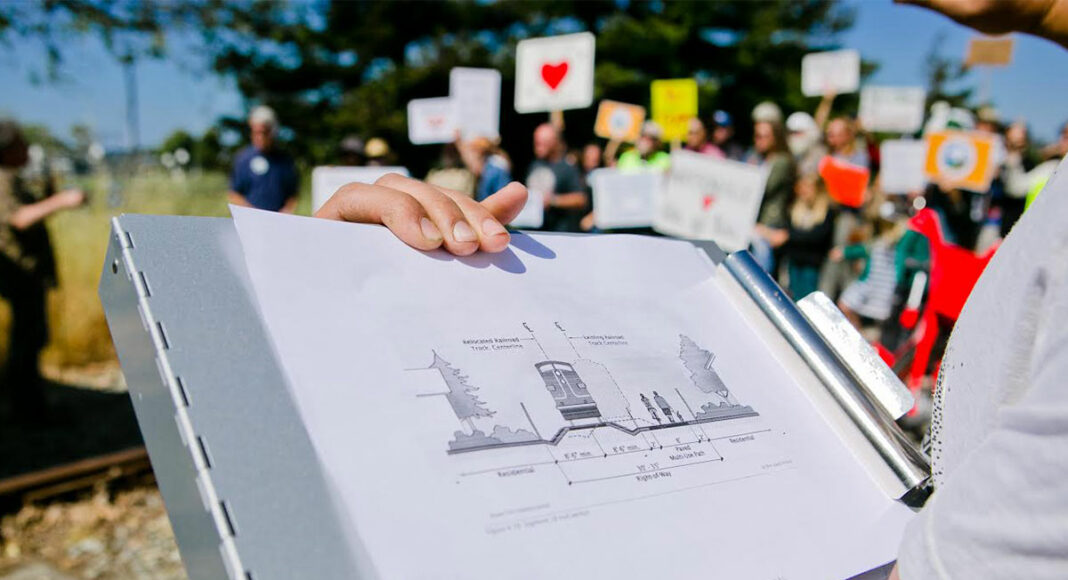Train supporters hoped the county was on track to soon see more robust freight service on its mostly-dormant coastal rail line. Activists from the environmental advocacy group Greenway, however, have geared up for yet another attempt to derail the whole effort, questioning the evaluation process for the project—or lack thereof, anyway.
Greenway, a local anti-rail group, filed a lawsuit against the Regional Transportation Commission [RTC] in Santa Cruz County Superior Court on Thursday. The complaint alleges that the commission did not comply with the California Environmental Quality Act [CEQA] when drafting an agreement with Progressive Rail, after previous operator Iowa Pacific announced that it wanted to pull out of its agreement last year.
The complaint alleges that impacts from increased freight service will include more noise, public health impacts from exposure to diesel particles, safety concerns at street crossings, visual impacts, and potential harm to the Watsonville Wetlands.
The RTC and local civil engineers are proceeding with plans to design and build a bike and pedestrian trail alongside the train tracks. The commission has planned to keep open the option of introducing passenger rail service on the tracks, all as part of a project typically called the “rail trail.” The first phase of the new rail agreement with Progressive focuses purely on freight service.
Greenway has long argued that—due to high costs and low projected ridership of passenger service—the whole corridor would be better off with a wider trail and no rail service at all, at least north of Watsonville, where there are more freight customers. (Rail service is generally considered more popular in Watsonville, where high-profile agricultural and lumber companies ship out goods to destinations around the country.)
Greenway Boardmember Manu Koenig says the decision to sign the Progressive Rail deal threw a wrench in the entire public process. The new 10-year contract, he says, will interfere with the transparent process promised by Measure D. That wide-ranging transportation tax initiative, approved by voters in 2016, led to the Unified Corridor Study, which is currently underway. The study, expected to be complete later this year, will explore a variety of north-south thoroughfares for transportation improvements, including options along the rail corridor.
RTC Spokesperson Shannon Munz says the RTC does not comment on pending litigation, but it doesn’t sound like the case worries commission staffers.
“In regards to the contract with Progressive Rail, it continues the function of the rail line, as it existed before the RTC’s acquisition of the line in 2012, and preserves all the options for the use of the line in the future,” Munz says, via email. “The commission is confident that it scrupulously followed the law when it approved the contract, and we look forward to the resolution of these issues in court.”
Koenig says Greenway’s legal case is similar to one in Humboldt County, where the North Coast Railroad Authority had been trying to extend train service through Eel River Canyon. The California Supreme Court ultimately decided in favor of anti-rail environmentalists there, last year ruling that the North Coast project did, in fact, need to follow CEQA guidelines. Greenway has hired the same firm that won that case to represent itself.
The CEQA argument from Greenway is not a new one. The group previously made its case about environmental compliance—and rallied supporters to the cause—before the RTC, in the hours, weeks and months leading up to commissioners casting their votes.
But much of Santa Cruz County’s new freight agreement is identical to the old one. County Counsel Brooke Miller, who represents the RTC, told GT in April that although CEQA does apply when establishing new freight service, it does not factor in when picking a new operator. “We have a different set of facts here,” she said.
Koenig feels that what Progressive wants to do is on an entirely different scale from what the county has seen prior.
“Our position is that this is a substantial increase in use,” Koenig says. “And everything in Progressive’s agreement states that. The way they have talked about using the rail line represents an increase in use.”














Greenway is not an environmental group. They are a lobbying group against a particular transportation mode, who use a variety of hard ball tactics to try to overturn the while of voters and their elected representatives.
And, yes, they are dominated and funded largely by people who live close to the tracks, many in property that would go up dramatically if the public corridor becomes a linear park with a path and County pays $14M to the state so that the 120 year old rail line can be abandoned (although they talk about ‘railbanking’ it).
while = will
CEQA is unnecessary for the continuation of existing freight services, and unwarranted while the Unified Corridors Study is looking at four different uses for the rail corridors. This lawsuit seems to be yet another attempt to delay trail construction and convert the right of way to permit private exploitation by a privileged few.
Greenway is formed as a 501(c)4 “Mutual Benefit Corporation”, exempt from reporting their sources of income. This is also known as “Dark Money” funding, we can’t look behind the curtain to see what is really going on with this group. I hope they see the light and start helping us build the rail trail.
More about 501(c)4 organizations:
https://www.pbs.org/wgbh/frontline/article/flashback-what-role-do-501c4s-play-in-campaign-finance/
http://www.latimes.com/opinion/editorials/la-ed-irs-darkmoney-20180719-story.html
Thank you, Barry. Very informative!
Is Greenway a wolf in sheep’s clothing? Read more here:
https://www.nytimes.com/2018/06/19/climate/koch-brothers-public-transit.html
Thanks, Dan! Shocking. The Koch’s are poising this country at every turn.
And here we are, four years later, with the long awaited Greenway Ballot Measure to kill rail transit, aka “Measure D” having been soundly defeated 74.4% of voters having said “No Way Greenway”.
Let’s hope we return to planning for immediate work toward phased implementation of electric light rail with continued freight capability for a future use of our publicly owned rail line.
Thank you, RTC and Roaring Camp!